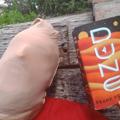Machinedreamread reviewed Demon Copperhead by Barbara Kingsolver
Heartfelt and Sad, worth the read
4 stars
Demon Copperhead had me hoping for the best outcome for the main character Demon the whole story. This was a book with a lot of heartbreak but had a hopeful ending. Shines a light on the opioid epidemic and how it has taken over so many people’s lives. Good book. I want to read David Copperfield by Dickens now to see how these two compare. Great narrator! (listened through Libby)
Demon Copperhead had me hoping for the best outcome for the main character Demon the whole story. This was a book with a lot of heartbreak but had a hopeful ending. Shines a light on the opioid epidemic and how it has taken over so many people’s lives. Good book. I want to read David Copperfield by Dickens now to see how these two compare. Great narrator! (listened through Libby)












